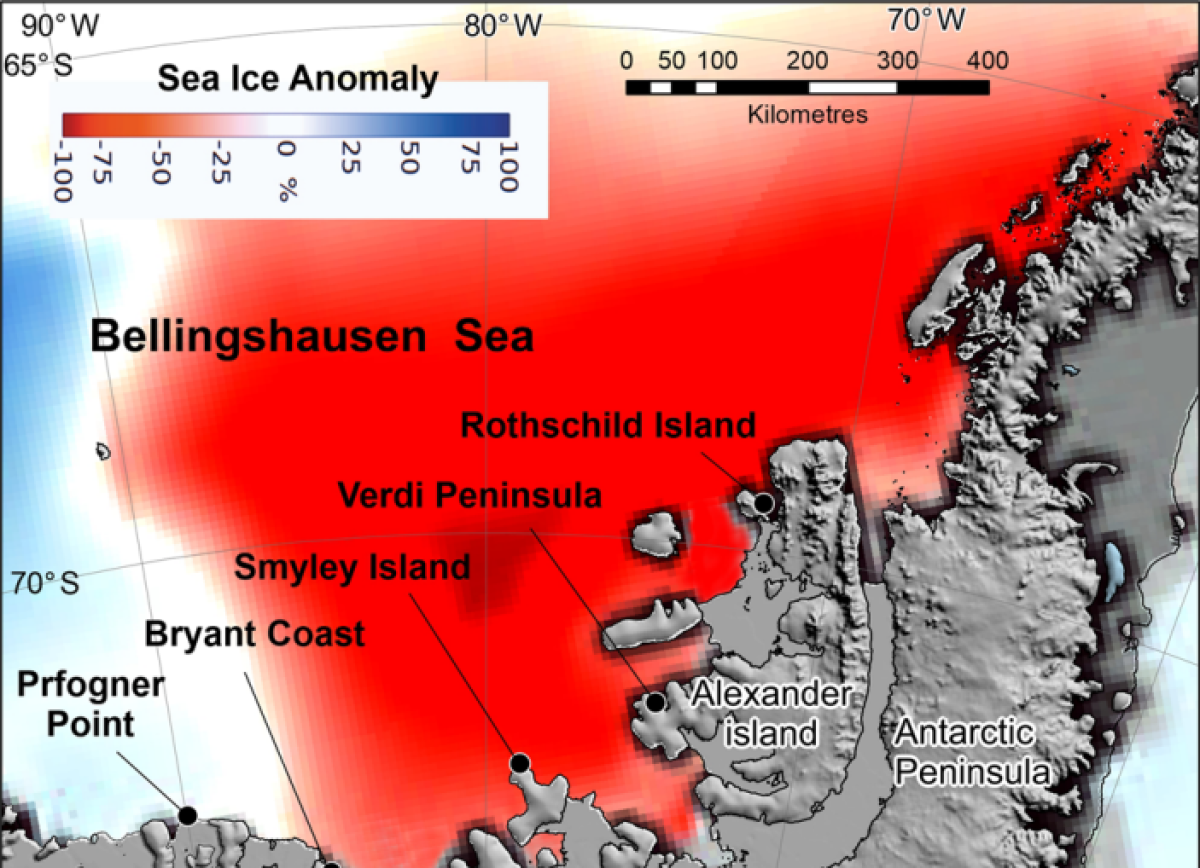Four of the five emperor penguin colonies in Antarctica's Bellingshausen Sea near-total breeding failure last year as a result of declining sea ice across the continent.
These emperor penguin colonies—Rothschild Island, Verdi Inlet, Smyley Island, Bryan Coast, and Pfrogner Point—usually produce thousands of chicks every year. The number of breeding pairs that each lay one egg varies between an average of 630 on Rothschild Island to around 3,500 on Smyley Island.
In 2022, however, the Verdi Inlet, Smyley Island, Bryant Coast, and Pfrogner Point colonies were totally abandoned due to melting sea ice before the fledgling period where chicks would be raised, indicating that these four colonies had no surviving chicks that year. That's according to a new study published in the journal Communications Earth & Environment.

"Overall the five colonies have around 10,000 pairs of adults so around 10,000 chicks each year. Last year we think that 820—the ones counted at Rothschild Island, may have survived," Peter T. Fretwell, a researcher at the British Antarctic Survey and lead author of the paper, told Newsweek.
Emperor penguins are dependent on stable sea ice, laying their eggs on this 'land-fast' ice in the winter between May and June. They hatch them 65 days later, and raise the chicks to fledge in the following summer, in December and January.
The reason for this reproductive failure is that the sea ice melted before the chicks would have grown large enough to make waterproof feathers that would allow them to swim: by December 2022, Antarctic sea ice extent had matched the previous all-time low set in 2021.
"When sea ice breaks up the consequences for unfledged emperor penguin can be terminal. The ice will break up, sometimes disintegrating, sometimes breaking into floes that float away. For the chicks that go into the water they will drown, if they are immersed but managed to get back out of the water they will most likely freeze to death if they have not got their waterproof feathers—I saw this happen in 2010 when a freak early rainstorm hit snow hill emperor penguin colony, hundreds of chicks got wet and froze to death as there wet feather could not keep them warm," Fretwell said.

"Even if they manage to say on the bergs the assumption is that most of them will drift away and starve as the parents will not be able to find them. The only hope is if the chicks have developed enough of their waterproof feathers to swim and keep themselves warm, but this won't happen until early-to-mid December."
Some of the lowest ice extent was seen in the central and eastern Bellingshausen Sea region, which is where these five colonies are located.
This was the second year of breeding failure at several of these sites Fretwell explains, and may be a sign of population declines to come in the future with the effects of climate change.
"This year, 2023, is likely to be even worse looking at the current sea ice extent. Although emperor penguins are a long-lived species, continued breeding failure is likely to drive the overall adult population down over time as new recruits to the breeding population fail to show up. This is consistent with our population models, which estimate that, due to sea ice loss, the overall population of the species will reduce rapidly over the coming decades—this is of course dependent upon if we can slow down global warming and out greenhouse gas emissions," Fretwell said.
"All our predictions of sea ice and emperor populations suggest that this will get a lot worse. How bad depends on whether we can slow or halt our greenhouse gas emission."

Antarctic sea ice has been declining sharply over the past few years, hitting a record low in December 2022. As of August 20, the study explained. the sea ice extent was 850,000 square miles lower than the average between 1981 and 2022, the equivalent of over three times the size of Texas. Additionally, the four lowest sea ice extent years since records began have occurred since 2016.
These changes are almost certainly a result of the changing climate.
"Year-to-year changes in sea ice extent are linked to natural atmospheric patterns such as El Niño-Southern Oscillation, the strength of the southern hemisphere jet stream, and regional low-pressure systems," Caroline Holmes, a polar climate scientist at BAS, said in a statement. "We'll need years of targeted observations and modeling to know precisely how much the current conditions are being influenced by these phenomena and by natural ocean variability. However, the recent years of tumbling sea ice records and warming of the subsurface Southern Ocean point strongly to human-induced global warming exacerbating these extremes."

According to the paper, more than 90 percent of emperor penguin colonies could be wiped out by the end of the century if global warming continues as predicted.
"This paper dramatically reveals the connection between sea ice loss and ecosystem annihilation. Climate change is melting sea ice at an alarming rate. It is likely to be absent from the Arctic in the 2030s," Jeremy Wilkinson, a sea ice physicist at BAS, said in a statement. "It is another warning sign for humanity that we cannot continue down this path, politicians must act to minimize the impact of climate change. There is no time left."
Do you have a tip on a science story that Newsweek should be covering? Do you have a question about penguin breeding? Let us know via science@newsweek.com.
Uncommon Knowledge
Newsweek is committed to challenging conventional wisdom and finding connections in the search for common ground.
Newsweek is committed to challenging conventional wisdom and finding connections in the search for common ground.
About the writer
Jess Thomson is a Newsweek Science Reporter based in London UK. Her focus is reporting on science, technology and healthcare. ... Read more





